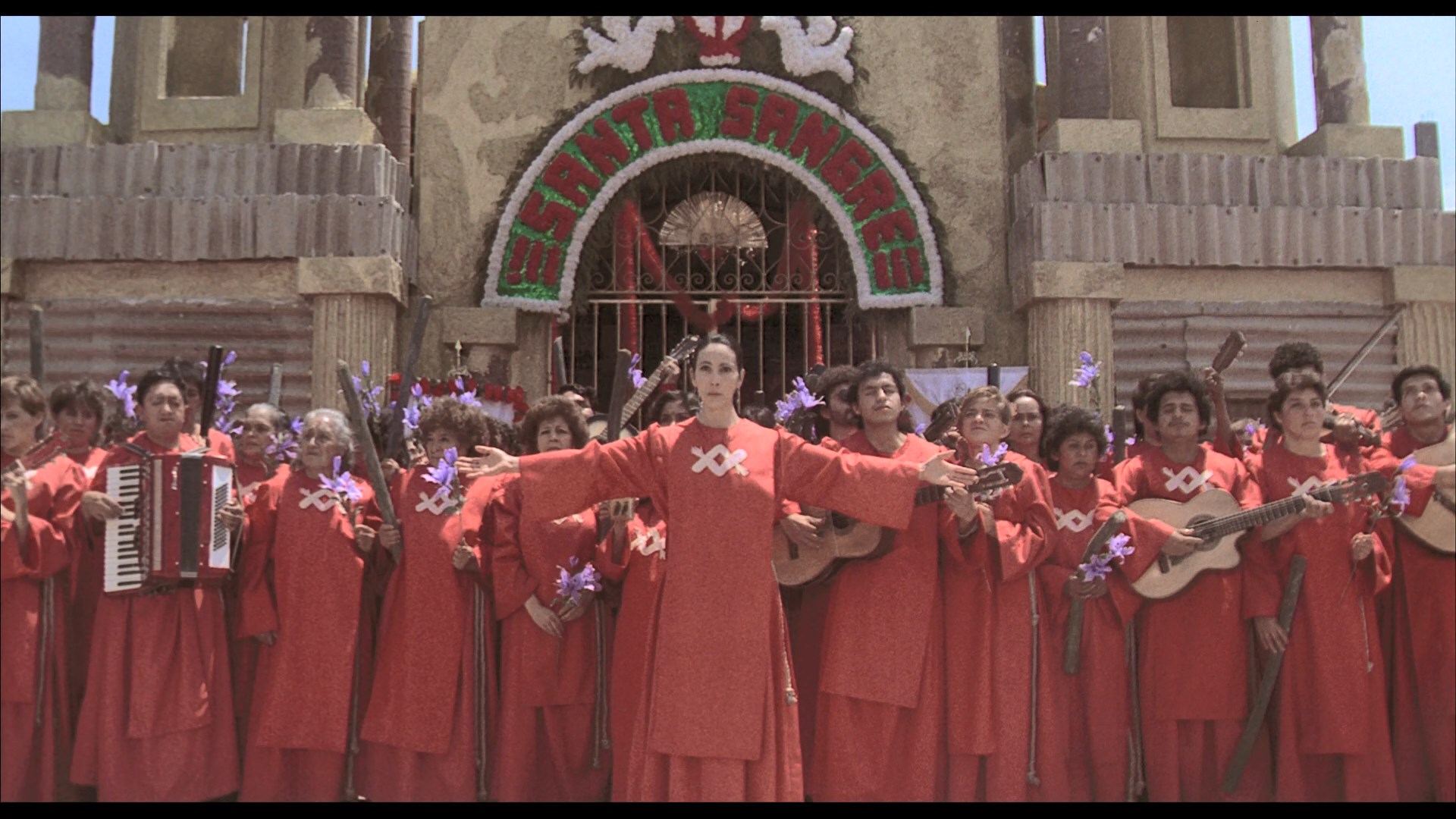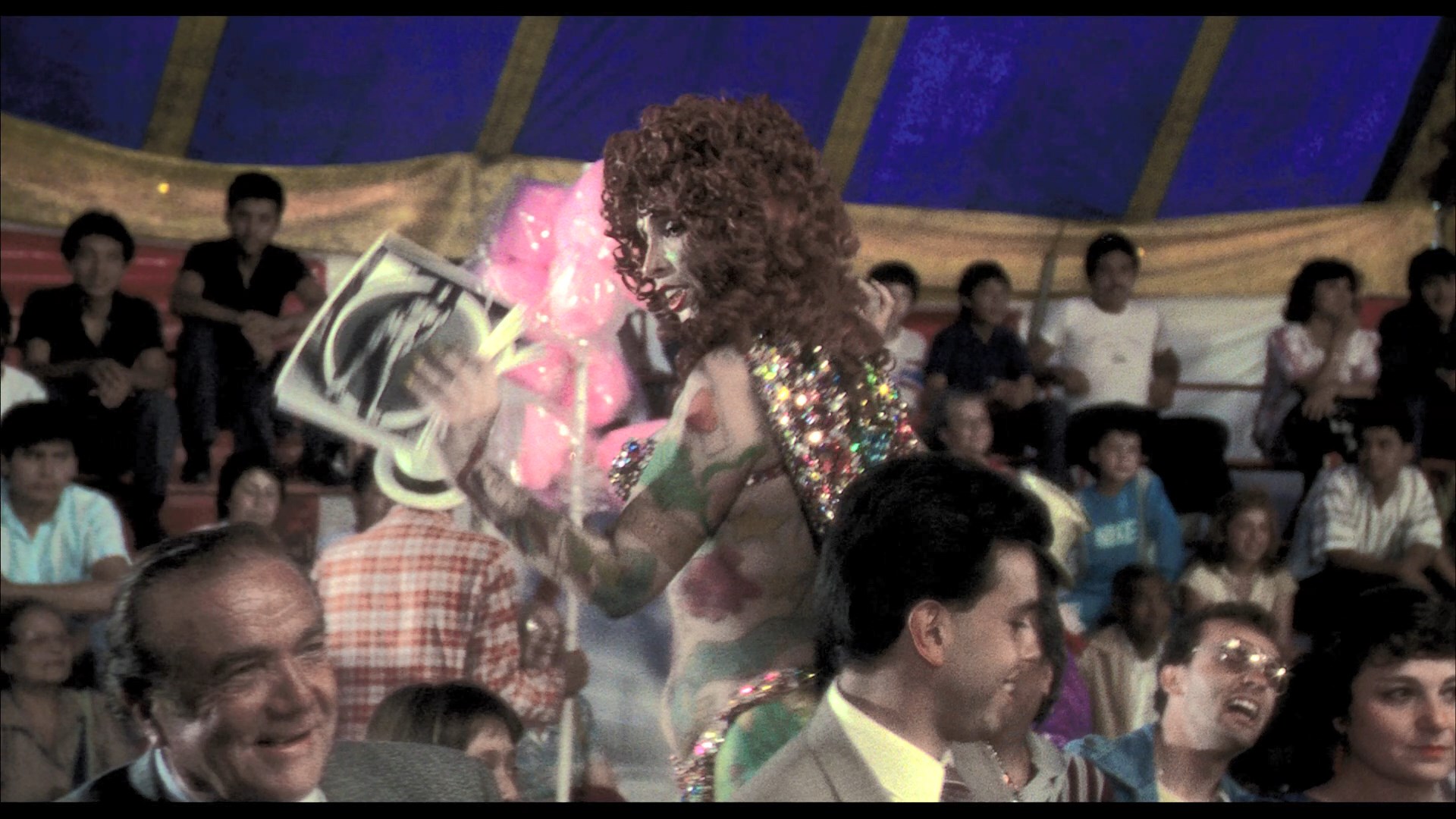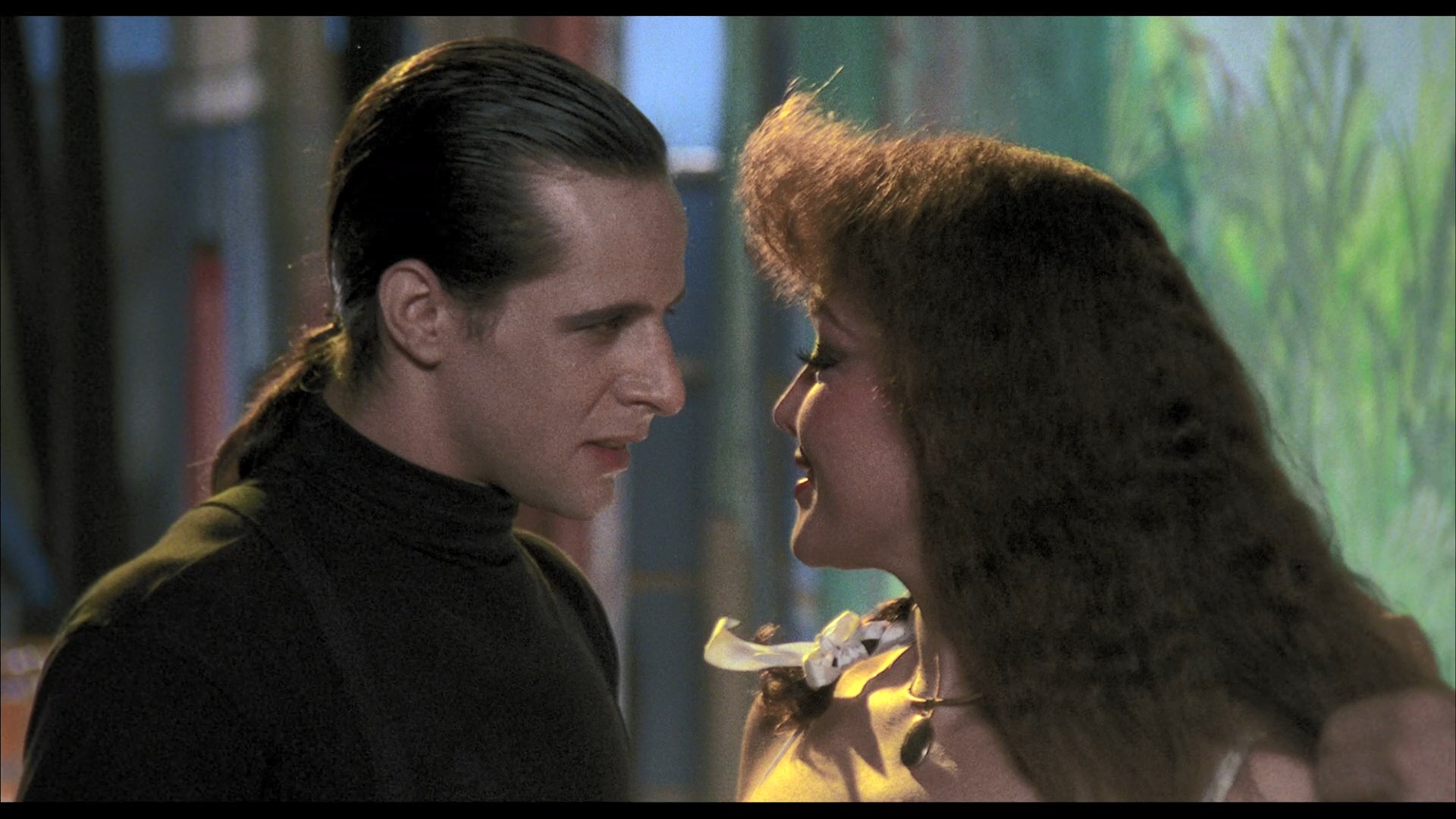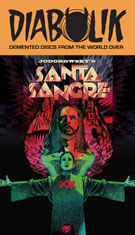
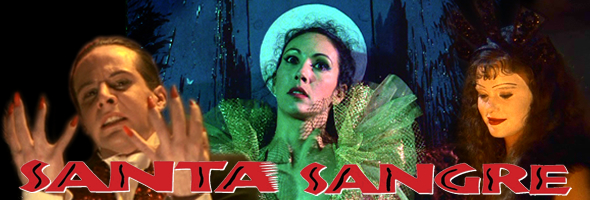
Color, 1989, 124m.
Directed by Alejandro Jodorowsky
Starring Axel Jodorowsky, Blanca Guerra, Guy Stockwell, Thelma Tixou, Sabrina Dennison, Adan Jodorowsky
Severin Films (UHD, Blu-Ray, DVD) (US R0 4K/HD/NTSC), Mr. Bongo (Blu-ray) (UK R0 HD), Anchor Bay (DVD) (UK R2 PAL) / WS (1.78:1) (16:9)
 The Holy Mountain filmmaker after the disastrous fate of his prior film, 1980's rarely seen Tusk. Fortunately the 19-year
The Holy Mountain filmmaker after the disastrous fate of his prior film, 1980's rarely seen Tusk. Fortunately the 19-year  interim allowed him to craft his most deeply affected and accessible film to date, a stunning statement about the nature of human will and the role of violence and bloodshed in everyday life. It also happens to be one of the great hallucinatory experiences in cinema, a visually intoxicating horror trip that makes a perfect introduction for viewers eager to travel down the more rarely explored routes of international film.
interim allowed him to craft his most deeply affected and accessible film to date, a stunning statement about the nature of human will and the role of violence and bloodshed in everyday life. It also happens to be one of the great hallucinatory experiences in cinema, a visually intoxicating horror trip that makes a perfect introduction for viewers eager to travel down the more rarely explored routes of international film. 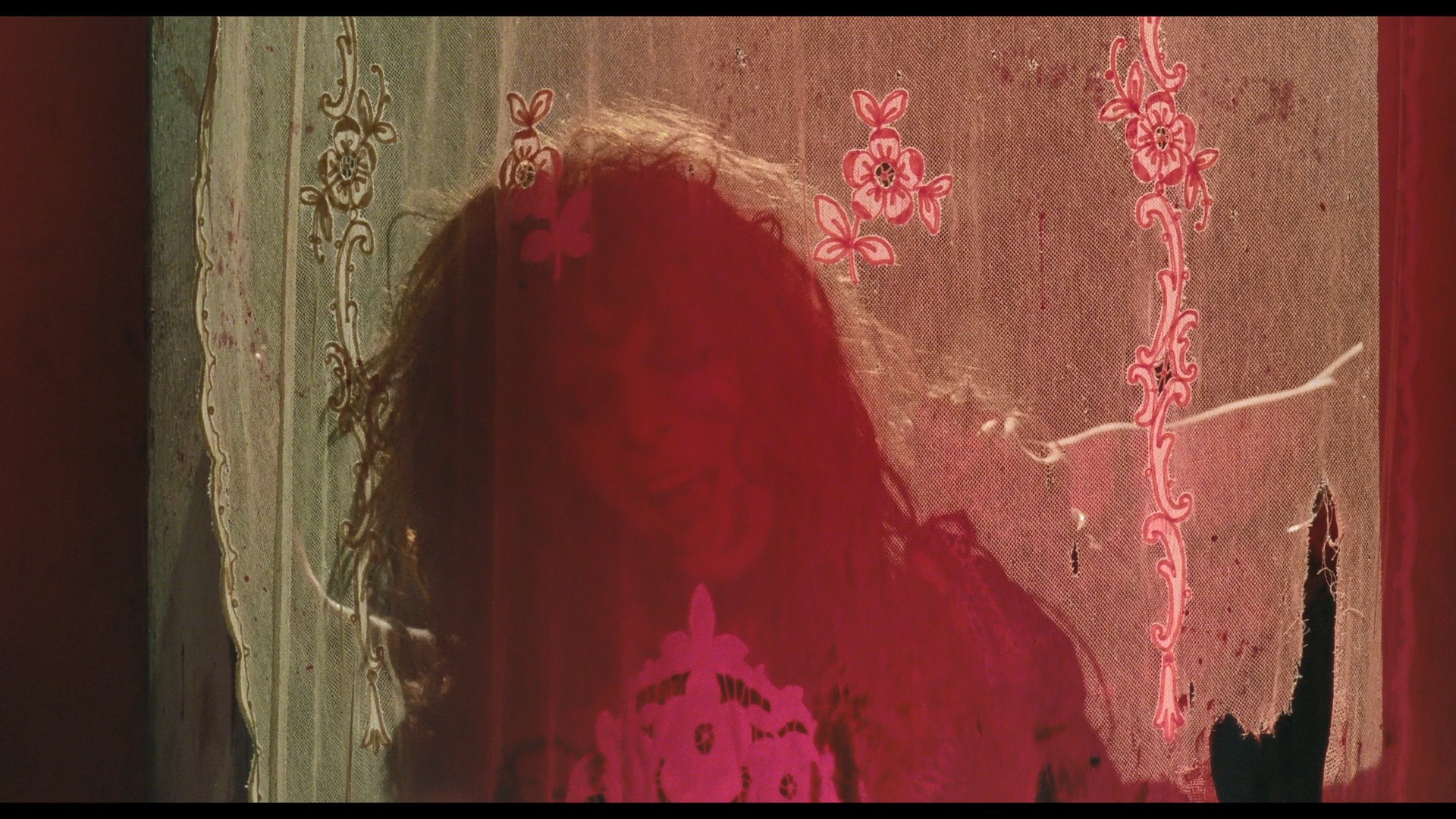 with vivid characters and incidents including the circus denizens, the real-life downtrodden residents of Mexico City, a gender-bending
with vivid characters and incidents including the circus denizens, the real-life downtrodden residents of Mexico City, a gender-bending  Mexican female wrestler, four of Jodorowsky's sons in different roles (with the youngest, Adan, playing Fenix in the childhood scenes), and the indelible mute, deaf character of his potential savior, Alma, a white-faced girl played as a youth and adult by the lovely Faviola Elenka Tapia and Sabrina Dennison, respectively. One fascinating influence on the film is producer Claudio Argento, who worked on many of his brother Dario's films and whose Italian financing gives the film a unique multinational flavor. The most noticeable of these is composer Simon Boswell, a veteran of Phenomena, Demons 2, and Stage Fright (not to mention later films like Hardware and Dust Devil), whose haunting electronic soundscapes here still rank among his best work. (More surprisingly, one of the executive producers was the infamous and very prolific Rene Cardona Jr.; to say the least, this is the greatest film to ever bear his name.)
Mexican female wrestler, four of Jodorowsky's sons in different roles (with the youngest, Adan, playing Fenix in the childhood scenes), and the indelible mute, deaf character of his potential savior, Alma, a white-faced girl played as a youth and adult by the lovely Faviola Elenka Tapia and Sabrina Dennison, respectively. One fascinating influence on the film is producer Claudio Argento, who worked on many of his brother Dario's films and whose Italian financing gives the film a unique multinational flavor. The most noticeable of these is composer Simon Boswell, a veteran of Phenomena, Demons 2, and Stage Fright (not to mention later films like Hardware and Dust Devil), whose haunting electronic soundscapes here still rank among his best work. (More surprisingly, one of the executive producers was the infamous and very prolific Rene Cardona Jr.; to say the least, this is the greatest film to ever bear his name.)
 La Constellation Jodorowsky doc (86m43s) (which has appeared
La Constellation Jodorowsky doc (86m43s) (which has appeared  on most of his DVD titles dating back to the original Fando & Lis), a live interview with the director (25m40s), and Adan's three-minute B&W short film, "Echek."
on most of his DVD titles dating back to the original Fando & Lis), a live interview with the director (25m40s), and Adan's three-minute B&W short film, "Echek."
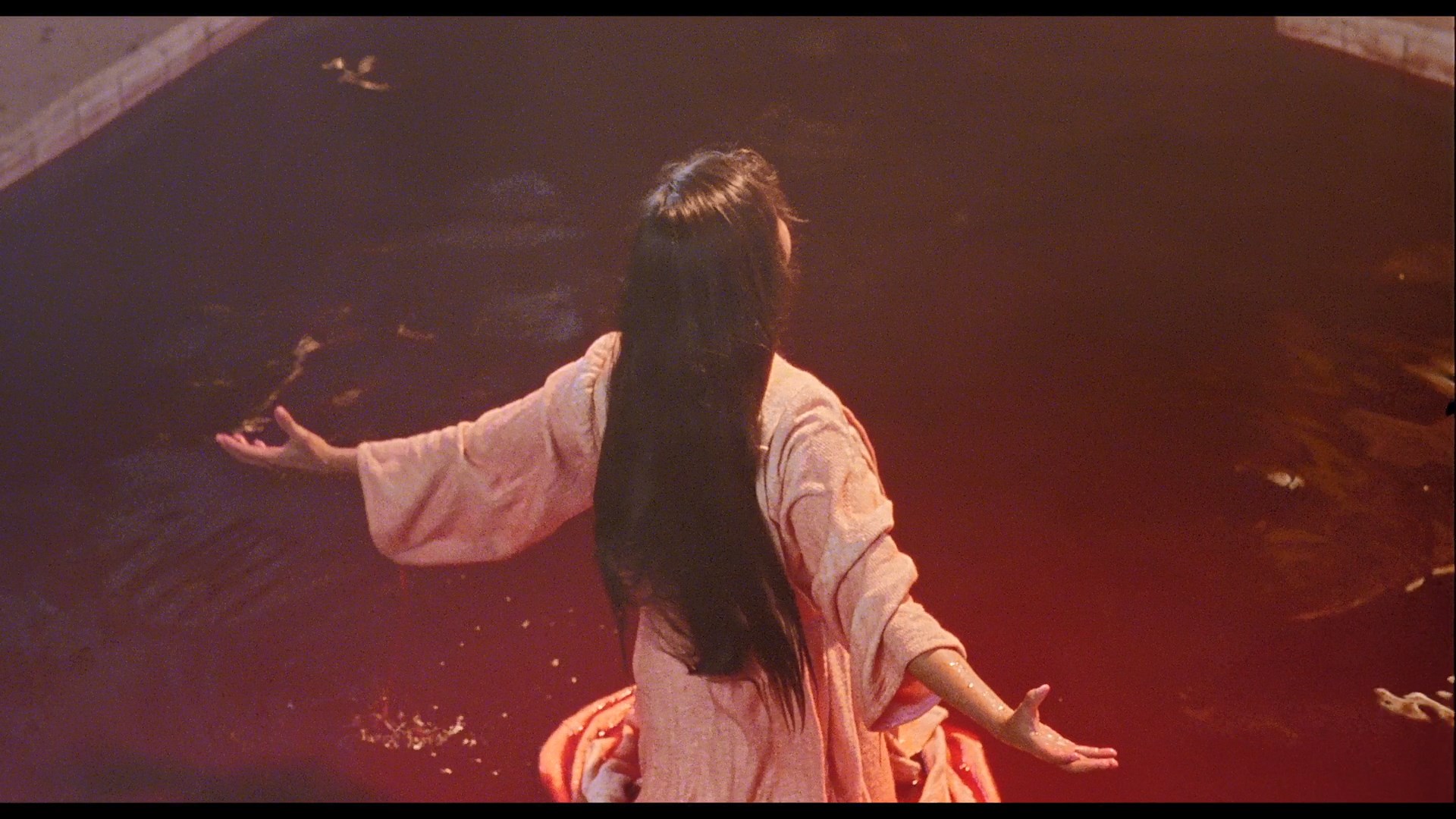 problematic scene.
problematic scene.  Boswell's participation is a bit limited but covers the ground of his score well enough, while the still stunning Guerra talks about the development of her wild pantomime routine (adapted from a Jorodowsky piece written for Marcel Marceau) and the hilarious, bawdy technique she used to walk as one with Axel during the intense climax.
Boswell's participation is a bit limited but covers the ground of his score well enough, while the still stunning Guerra talks about the development of her wild pantomime routine (adapted from a Jorodowsky piece written for Marcel Marceau) and the hilarious, bawdy technique she used to walk as one with Axel during the intense climax.  and "Alejandro Jodorowsky's Cult Cinema" (27m3s), a Wild Side documentary with journalist Jean-Paul Coillard (and his cute cat), illustrator Francois Boucq, writer Coralie Trinh Thi, director Jan Kounen, and Brontis Jodorowsky chatting about his entire body of work and the esoteric interests it
and "Alejandro Jodorowsky's Cult Cinema" (27m3s), a Wild Side documentary with journalist Jean-Paul Coillard (and his cute cat), illustrator Francois Boucq, writer Coralie Trinh Thi, director Jan Kounen, and Brontis Jodorowsky chatting about his entire body of work and the esoteric interests it  encompasses.
encompasses. Cardenas short, the 2003 interview and stage Q&A, "Echek" with
Cardenas short, the 2003 interview and stage Q&A, "Echek" with  optional commentary, the Boswell/Jodorowsky interview (along with an accompanying 2m2s "Blink Jodorowsky" short from the same session), and the "Close Your Eyes" music video. However, there's also a generous heap of new extras as well starting off with "Like a Phoenix" (38m22s) with producer Claudio Argento recalling how the film's Italian production status came about (even though he feels it has nothing to do with Italian cinema), what drew him to the project, and his thoughts on the state of his career at the time both with and without his famous director brother. In "Holy Blood" (42m8s), cinematographer Danielle Nannuzzi explains how he felt intimidated going into the film and used his fears at the start to spend some preparation time in Mexico City and get deeper into his director's frame of mind. Then executive producer Angelo Iacono appears in "Mexican Magic" (36m7s) to discuss the issues with getting Jodorowsky back to Mexico (since he was barred after shooting his first two films there) and the challenges of shooting there once the problem was cleared up, as well as his simpatico artistic sensibilities with Jodorowsky and an attempt to cast Rosanna Arquette and Tony Curtis in this film. He also goes into some crazy stuff about Mexican filmmaker Emilio Fernandez, but you can find that out for yourself. In "The Language of Editing" (21m13s), editor Mauro Bonanni talks about getting hired for the film after a long delay from his first interview with Argento, the differences between American and Italian production methods, and the tactics used to capture daunting scenes like the big parade and the falcon shots. Finally, "Innocence and Horror" (28m48s) has screenwriter Roberto Leoni explaining his attraction to the film's premise, the method of burrowing into a story about a serial killer, and his experiences working on the script in Paris and learning about the tarot from Jodorowsky. Also included is a look at the film's 30th anniversary celebration in Mexico City (10m) with Geurra, Adan Jodorowsky, and company at the Morbido Festival fondly talking about the location scouting, the tattoo creations, and the local wrangling necessary to pull off filming in some very public spaces. Also included is the original soundtrack CD, which is great to have back in circulation.
optional commentary, the Boswell/Jodorowsky interview (along with an accompanying 2m2s "Blink Jodorowsky" short from the same session), and the "Close Your Eyes" music video. However, there's also a generous heap of new extras as well starting off with "Like a Phoenix" (38m22s) with producer Claudio Argento recalling how the film's Italian production status came about (even though he feels it has nothing to do with Italian cinema), what drew him to the project, and his thoughts on the state of his career at the time both with and without his famous director brother. In "Holy Blood" (42m8s), cinematographer Danielle Nannuzzi explains how he felt intimidated going into the film and used his fears at the start to spend some preparation time in Mexico City and get deeper into his director's frame of mind. Then executive producer Angelo Iacono appears in "Mexican Magic" (36m7s) to discuss the issues with getting Jodorowsky back to Mexico (since he was barred after shooting his first two films there) and the challenges of shooting there once the problem was cleared up, as well as his simpatico artistic sensibilities with Jodorowsky and an attempt to cast Rosanna Arquette and Tony Curtis in this film. He also goes into some crazy stuff about Mexican filmmaker Emilio Fernandez, but you can find that out for yourself. In "The Language of Editing" (21m13s), editor Mauro Bonanni talks about getting hired for the film after a long delay from his first interview with Argento, the differences between American and Italian production methods, and the tactics used to capture daunting scenes like the big parade and the falcon shots. Finally, "Innocence and Horror" (28m48s) has screenwriter Roberto Leoni explaining his attraction to the film's premise, the method of burrowing into a story about a serial killer, and his experiences working on the script in Paris and learning about the tarot from Jodorowsky. Also included is a look at the film's 30th anniversary celebration in Mexico City (10m) with Geurra, Adan Jodorowsky, and company at the Morbido Festival fondly talking about the location scouting, the tattoo creations, and the local wrangling necessary to pull off filming in some very public spaces. Also included is the original soundtrack CD, which is great to have back in circulation.





